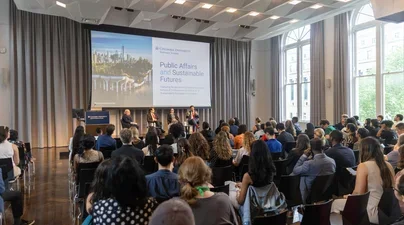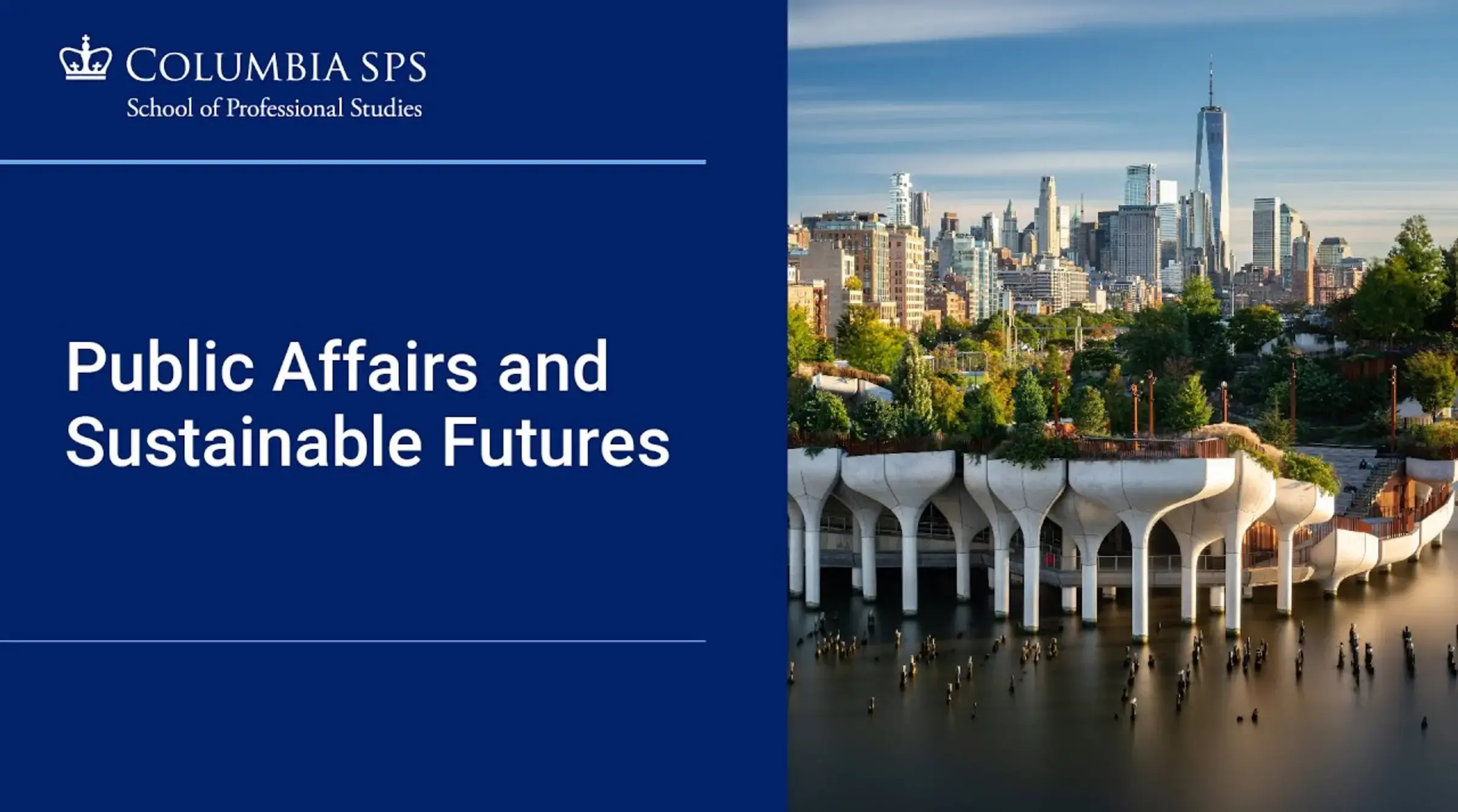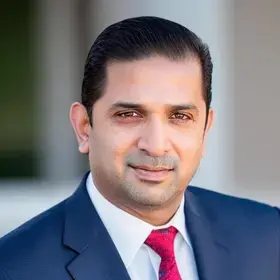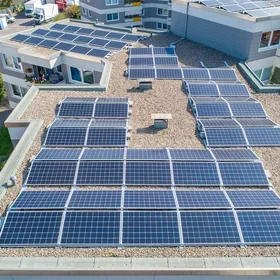On June 5, World Environment Day, a capacity crowd attended the first event in the 2024 Experience Columbia Summer Program, a series that features some of the University’s most accomplished faculty, alumni, and industry leaders in intimate discussions around timely themes.
The event was affiliated with the Columbia University School of Professional Studies (SPS) Visiting Students program’s Public Affairs and Sustainable Futures focus area, designed for students who are interested in the fast-paced world of the public sector and career pivoters interested in current events.
The evening’s discussion was hosted by Steve Cohen, senior vice dean of Columbia SPS, Professor of Practice at SIPA, and director of the M.S. in Sustainability Management program. Cohen has over 40 years of experience in the field of environmental advocacy and sustainability, and his research focuses on environmental policy, sustainability management, and the intersection of government, business, and civil society in addressing environmental challenges.
As Cohen welcomed the audience, he briefly mentioned his disappointment over Governor Kathy Hochul’s decision earlier that same day to press pause on a congestion pricing plan in New York City because it represented “one of the most important policy initiatives” put forward recently. Cohen has written in greater detail about Hochul’s decision but offered it as an example in the discussion to show how progress toward a circular economy happens “in fits and starts” and can often feel like “two steps forward and one step back.”
Cohen then turned the focus toward the panelists, all of whom are M.S. in Sustainability Management faculty and two of whom, Curtis Probst and Susanne DesRoches, were graduates of the SIPA’s Environmental Science and Policy program, and proudly noted that all the panelists were “major contributors to the world of sustainability management and policy in the region.”
“You Can’t Be a Sustainable City if People Can’t Afford to Live There”
Cohen kicked off the evening’s discussion by asking panelist Adam Freed, lecturer in Columbia’s Sustainability Management program and principal of sustainability at Bloomberg Associates, about the most impactful initiative he was presently working on.
“The work I do with cities at Bloomberg is 100% free of charge, and our only mission is to improve the quality of life for residents who live there,” Freed shared. “Sustainability practice is not just deep decarbonization, air quality, and water quality. It includes affordable housing. You can’t be a sustainable city if people can’t afford to live there.”
Freed expressed his excitement about working with the city of Phoenix to develop a “shade plan.” The city currently clocks more than 130 days per year of temperatures of 110 degrees or greater.
Freed explained that although Phoenix had instituted a citywide shade plan, it hadn’t considered where people were outside the most and hadn’t focused on equity and vulnerable populations. “We’re reshaping their efforts through a data-driven approach that we hope we can use in other cities,” he said.

Alignment of Public Purpose with Profit Motive
After highlighting the importance of the private sector’s involvement in a decarbonized economy, Cohen asked the panelists for examples in their work where public purpose aligns with profit motive.
DesRoches, a graduate of Columbia’s MPA in Environmental Science and Policy and a lecturer in the M.S. in Sustainability Management program, is the vice president of Clean and Resilient Buildings, New York State Energy Research and Development Authority (NYSERDA). Her work focuses on making the built environment more energy efficient, and she explained a range of innovative and incentivized partnerships.
“We are currently challenging real estate developers with huge portfolios to join with us (NYSRDA) to commit to carbon neutrality by 2050,” she said. “Right now, we have Empire Realty, who manages the Empire State Building, and a group of 16 real estate developers that are part of this cohort. We are currently working with them to develop a phased plan for decarbonization to cut carbon emissions by 80% over seven years with a 10-year payback. And in doing so, we make this cohort become a poster child for the benefits of decarbonization to incentivize other developers.”
In addition to creating incentives for joining the cohort, DesRoches explained how her organization drives innovation by inviting the manufacturing community to solve the technological questions that arise when trying to retrofit buildings owned by the cohort. “We ask, ‘what can you do to replace a huge boiler?’ Then ‘can you scale it?’ It’s a great way to involve more parts of the building community and reward them for innovation.”
Economic Sense Outweighs Opinion
Cohen asked the panelists how the culture has changed since they first started working in the field.
Curtis Probst, lecturer in Columbia’s Sustainability Management program and CEO of New York City Energy Efficiency Corporation (NYCEEC)—one of approximately 40 green banks operating nationally—remarked, “Whether or not you believe that the climate is changing is starting to matter less because the economics of making buildings quieter, more efficiently cooled and heated, and built to resist floods makes financial sense.” He pointed out that Texas, following the economic sense of switching energy sources, is now first in the nation in wind power and second in solar.
Probst explained that green banks provide financing to fill the gaps in the clean energy transition and reinforce the equitable emphasis of sustainability, as 60% of Probst’s own green bank’s funding supports multi-family affordable housing, and 85% of NYCEEC work is in, or supports, low or moderate-income communities through community centers, assisted living, community health facilities, schools, and faith-based institutions.
Following the discussion, a Q&A session focused primarily on issues relating to a specific example of the frequent flooding in New York City’s subways and bus stations. The panelists pointed out that multiple entities are involved in assessing public transportation infrastructure, so the issue demonstrated the complexity involved in mitigating urban flooding. Freed pointed out that every inch of rain that falls in New York City amounts to a billion gallons of stormwater, which compounds flooding. “Building for sustainability while planning for growth has to be smart, thoughtful, and intentional,” he said.
“We know what needs to get done,” Freed explained. “The slow pace, the status quo has gotten us here. We need to scale up the pace of change with new processes and new approaches. We cannot talk about these things enough.”
About the Program
The Columbia University M.S. in Sustainability Management program offered by the School of Professional Studies in partnership with the Climate School provides students cutting-edge policy and management tools they can use to help public and private organizations and governments address environmental impacts and risks, pollution control, and remediation to achieve sustainability. The program is customized for working professionals and is offered as both a full- and part-time course of study.



